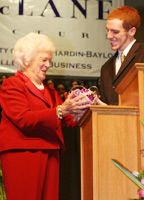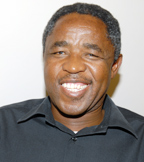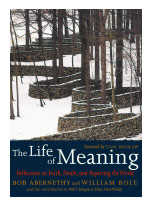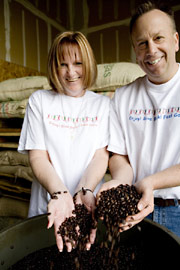Posted: 4/13/07
|
| Five hundred people from 40 churches attended the “Celebrating Senior Adults Conference” at Central Church in Jacksonville. In addition to 10 breakout topics, participants heard from Baptist General Convention of Texas Executive Director Charles Wade, Ken Hall of Buckner International and Paul Powell of Truett Theological Seminary. |
Around the State
• The University of Mary Hardin-Baylor will host a Governor’s Forum at 9:30 a.m. April 19, featuring former Texas governors Dolph Briscoe and Mark White. It is free and open to the public.
 |
| Hardin-Simmons University in Abilene has received a rare and valuable manuscript. The ancient Sefer Torah scroll contains more than 200 columns comprising the Pentateuch, the five books of Moses, which appear as the first five books of the Christian Old Testament and the Jewish Bible. Scribed in Hebrew on highly finished white cow vellum panels, the scroll about 27 inches tall. It is the product of a South Arabian Jewish scriptorium, published in the late 17th or early 18th century. The scroll has been appraised at a market value at more than six-figures, but many experts believe the document to be priceless. Robert Ellis (left), associate dean of Logsdon Seminary, evaluated the scroll after unpacking it. Doyle and Inez Kelley, benefactors of the Kelley College of Business at HSU, gave the scroll to the university. (Photo by Tiffany Turk) |
• Dallas Baptist University will hold the 19th annual Norvell Slater Senior Adult Hymn Sing at 2 p.m. April 20. Last year, almost 1,000 senior adults attended the event. For more information, call (214) 333-6824.
• The modern foreign languages department of the University of Mary Hardin-Baylor will present an evening of bilingual storytelling, “Our Stories—Nuestros Cuentos,” at 7 p.m. April 21 in the Shelton Theater on campus. The event will consist of readings and comments by authors Araceli Ardon and Debbie Lufburrow. It is free and open to the public. For more information, call (254) 295-4631.
• Tickets are on sale for Howard Payne University’s fourth annual “Singin’ with the Saints” Southern gospel concert for senior adults. The concert will begin at 1:30 p.m. May 17 at Coggin Avenue Church in Brownwood. Featured performers will be The Florida Boys, Gold City, The Brazos Boys and HPU chancellor and humorist Don Newbury. Tickets are $12 and can be ordered by credit card at (800) 950-8465.
• Five inductees have been added to Hardin-Simmons University’s Hall of Leaders. Honored were George Anderson, who served as a trustee of the school 61 years; Bill Thorn, former pastor, author and president of Dallas Baptist University; Lee Hemphill, a former pastor andvice president emeritus of HSU; Jim Flamming, who was pastor of First Church in Abilene 17 years, chairman of the Executive Board of the Baptist General Convention of Texas, and BGCT vice president; and Jesse Fletcher, former HSU president and chancellor, professor at Logsdon Theologi-cal Seminary and Baptist historian.
• Rick Akins of Round Rock has been elected chairman of the board of trustees at Howard Payne University. An HPU graduate, he has been a member of the board 14 years, beginning in 1990. He is a member of First Church in Salado.
• Don Looser is retiring as vice president of academic affairs at Houston Baptist University after 43 years of service to the university. He joined the faculty in 1964 as an assistant professor in music as the first classes of the school were enrolling. Looser will continue serving the school in various capacities.
• Dallas Baptist University has presented the inaugural Tom Landry Leadership Award to Congressman Sam John-son.
• Charla Kahlig has been named controller at the University of Mary Hardin-Baylor.
• Pattie Orr has been appointed vice president for information technology and dean of libraries at Baylor University.
• The Wayland Baptist University Students in Free Enterprise Team won one of 17 regional competitions held across the nation. The teams create economic opportunities in their communities by organizing outreach projects. The Wayland team organized 28 projects in Plainview and the surrounding area that included working with older adults, businesses and school-aged children.
 |
 |
 |
 |
| Larry and Melinda Ewing |
Trent and Kay Jones |
 |
 |
|
|
| John and Lucy Long |
|
• Three couples with Texas ties have been appointed missionaries by the International Mission Board. Larry and Me-linda Ewing serve in Central and Eastern Europe in university ministry. Members of First Church in Lubbock, they have three adult children. Trent and Kay Jones will serve in South America; he will be a strategy planner and she will work in community outreach. He previously served as youth minister at Martindale Church in Martindale and Primera Iglesia in San Marcos. She was a youth intern at First Church in Wimberley. Travis Avenue Church in Fort Worth is their home church. John and Lucy Long will be church starters in Western Europe. He previously served three churches in Florida and College Heights Church in Plainview, where he was minsiter of education. They have one adult daughter.
Anniversaries
• Joe Walton, fifth, as director of missions for Double Mountain Association, April 25.
• Oakalla Church in Oakalla, 100th, April 28. A fellowship time will begin at noon, followed by a meal and song service. Clay Cole is pastor.
• John Hatch, 25th, as pastor of First Church in Lake Jackson, April 29. For a schedule of activities, e-mail rtedder@fbclj.org.
Deaths
• Jesus Perales, 64, Jan. 30 in Odem. He was pastor of Primera Iglesia El Calvario in Edroy. He is survived by his wife, Olivia; sons, Joel Perales and Orlando Serda; daughters, Elizabeth Ortiz, Yolanda Villarreal and Celinda Ermis; mother, Juanita Perales; step-son, Freddie Martinez; brother, Jose; 13 grandchildren; and one great-grandchild.
 |
| University of Mary Hardin-Baylor Student Body President Chris Burkley presented former U.S. first lady Barbara Bush with a bowl filled with purple and gold chocolate kisses to commemorate her speech at the school as part of the College of Business McLane Lecture Series. She also was awarded an honorary doctor of humanities degree. |
• Aaron Guajardo, 70, Feb. 15 in Mineral. A pastor for more than 40 years, he led churches in Corpus Christi, Portland, Ingleside, Rockdale and Pleasanton. He also started churches in Oregon and Washington. The last five years, he was pastor of Primera Iglesia in Mineral. For more than half his ministry, he was a bivocational pastor, while serving as a schoolteacher and later as a principal. He was preceded in death by his daughter, Delpha Martin. He is survived by his wife of 50 years, Livia; sons, Aaron and Josue; brothers, Alcides and Able; sisters, Aurora Garcia and Amanda Revelle; and nine grandchildren.
• Harry McConnell, 93, March 2 in Richmond, Va. A Foreign Mission Board missionary, he served in Chile 40 years. While there, he helped establish the Baptist Theologi-cal Seminary in Chile and later served as its president. He later served two years in Colombia, and then moved to El Paso, where he was the volunteer editor at the Baptist Publishing House. He was preceded in death by his wife, Mary. He is survived by his daughters, Elizabeth Finch, Ann Hollan-der, Martha Jelsma and Grace Alarcon.
• Avium Jordan, 100, March 9 in Abilene. During the 1950s and ’60s, she travelled across the state instructing churches on how to establish programs for preschoolers. From 1969 until her retirement in 1984, she supervised programs for preschool children of ap-pointees preparing for foreign mission service with the SBC Foreign Mission Board. She was preceded in death by her husband, Horace. She is survived by her daughter, Dorothy Fletcher; son, James; three grandchildren; and three great-grandchildren.
• Dan Boling, 71, March 22 in Petaluma, Calif. A retired professor of Christian education at Golden Gate Seminary, he was an Austin native. A Baylor graduate, he was Baptist Student Union director at the University of Texas at Arlington. He went on to serve as a minister of youth or minister of youth and music at a number of Texas churches before becoming assistant director of the Baptist Counsel-ing Center at Southwestern Seminary. He is survived by his wife, Elaine; daughters, Dianna Boling and Sara Gustafson; and two grandchildren.
• Virginia Koch, 96, March 26 in Dallas. She worked for the Baptist General Convention of Texas as an administrative assistant 20 years. She also was a volunteer at Baylor University Medical Center in Dallas, earning a 50-year service award. She was a member of Park Cities Church in Dallas. She was preceded in death by her husband, John. She is survived by her daughter, Virginia Lee Sher-man; three grandchildren; and four great-grandchildren.
• Carlos Paredes, 89, April 12 in Dallas. A Baylor graduate, he turned down an offer to sing tenor with the Metropolitan Opera to follow his call to ministry. In 1942, he was appointed by the Home Mission Board to be pastor of Primera Iglesia in Austin, where he served more than 27 years. During his tenure there, he also served four years as executive secretary and six years as president of the Mexican Baptist Convention of Texas. He chaired the committee that recommended unification with the Baptist General Convention of Texas. He later served as vice president of the BGCT. In 1970, he joined the convention in the evangelism division as he led efforts to reach Hispanics across the state. He preached in rallies across in the United States, Spain and several South American countries. He also served as interim pastor of Primera Iglesia in Dallas on several occassions. He was preceded in death by his sisters, Amelia Paredes and Tita Huizar; and brothers, Saul, Jose, Pedro and Abel. He is survived by his wife of 61 years, Irene; daughters, Ann Paredes, Sylvia Dela Rosa and Miriam Castonon; son, Charlie; six grandchildren; and four great-grandchildren.
Retiring
• Royce Measures, as pastor of Golden Acres Baptist Church in Pasadena, after 20 years of service there and more than 45 years in the ministry. A reception will be held at the church honoring him and his wife, Chris, April 29 at 11:30 a.m. For information, e-mail minofed@myweb.net or call (281) 487-0582.
• First Church in Midland held a ceremony commemorating placement of a historical marker granted by the Texas Historical Commis-sion April 15. The marker notes the church’s constitution in 1886. Gary Dyer is pastor.
• Agape Church has moved to its new location, the former site of Ridglea West Church in Fort Worth, April 15. The Ridglea West congregation gave the year-old congregation the facility at no cost after the 58-year old church decided the new church would better serve the community. Kris Barnett was pastor of the Ridglea West congregation. Paul Sands is interim pastor of the Agape congregation.
• Ergun Caner, president of Liberty Seminary, will speak at Orchard Hills Church in Garland April 22 at 10:30 a.m. He will share his testimony of how he came to know Jesus Christ as his Savior after being born a Muslim. Dickson Rial is pastor.
• First Church in Dever will hold its fifth annual gumbo cookoff and gospel sing April 28. Gumbo will be served at 5 p.m., and the singing will begin at 6 p.m. Featured vocal groups will be The Martins and The Rileys. For more information, call (936) 549-7653. Harry Mc-Daniel is pastor.
• R.L. Sumner, editor of the Biblical Evangelist, will speak at Northside Church in Highlands May 13 at 6 p.m. David Brumbelow is pastor.
Licensed
• Richard Robinson to the ministry at First Church in Kenedy.
• Meredith Stone to the ministry at Crosspoint Fellowship Church in Abilene.
• Ken Durham to the ministry at Richey Street Church in Pasadena.
• Mario Ramos to the ministry at Ridgemont Church in Abilene.
• Jay Monrad to the ministry at First Church in Woodsboro.
Ordained
• Charles Howard to the ministry at Christ the King Church in Waco.
• Amy Grizzle to the ministry at Wilshire Church in Dallas.
• Lonny Parson to the ministry at Powderly Church in Powderly.
• Gerardo Alfaro and Jeronimo Aviles to the ministry at Iglesia Getsemani in Fort Worth.
• Johnny Moore to the ministry at Temple Church in Gainesville.
• Terry Smith to the ministry at First Church in Floresville.
• Doug Kello to the ministry at Calvary Church in Weimar.
• Dustin Creech to the ministry at College Heights Church in Abilene.
• Brad Echols to the ministry at First Church in Vernon.
• Rick Hertless to the ministry at Meadowbrook Church in Rockdale.
• Trent Jones to the ministry at Martindale Church in Martindale.
• Mike Lyons to the ministry at First Church in Blanco.
• Roy Taylor as a deacon at Dixie Frontier Church in Whitesboro.
• Jerry Harris and Raymond Jeffrey as deacons at Wynnewood Church in Dallas.
• Sherrie Gunter, Marcus Martin, Mauricio Martinez, Marsha Mills, Pat Packard, Frances Phillips, Laura Trubey and Weldon Wells as deacons at Cliff Temple Church in Dallas.
• Joe Pullin as a deacon at First Church in Taft.
• Mark Patton, Roger Hughes, Jack Bray and C.T. Kutschke as deacons at Holly Brook Church in Hawkins.
Revivals
• Jericho Fellowship, Plainview; April 19-22; evangelist, Ed Sena; pastor, Joe Barrera.
• First Church, Cisco; April 22-23; evangelist, Dan Curry; music, Kade Curry; pastor, Craig Curry.
• First Church, Natalia; April 22-25; evangelist, Jonathan Hewitt; music, The Atens; pastor, Billy Morse.
• Friendship Church, Doddridge, April 26-29; evangelist, Clayton Sheets; pastor, Phil Starrett.
• Enon Church, Doddridge; April 29-May 2; evangelist, Jim Moss; pastor, Jim Rust.
News of religion, faith, missions, Bible study and Christian ministry among Baptist churches, in Texas, the BGCT, the nation and around the world.














